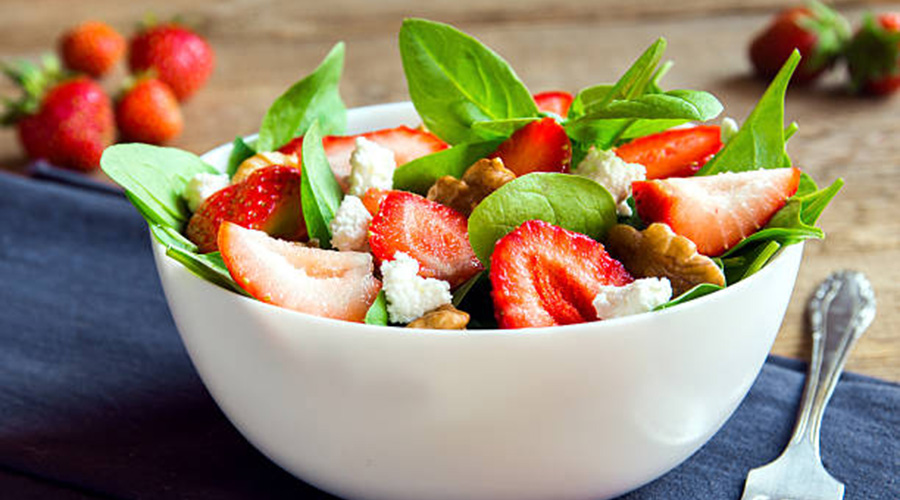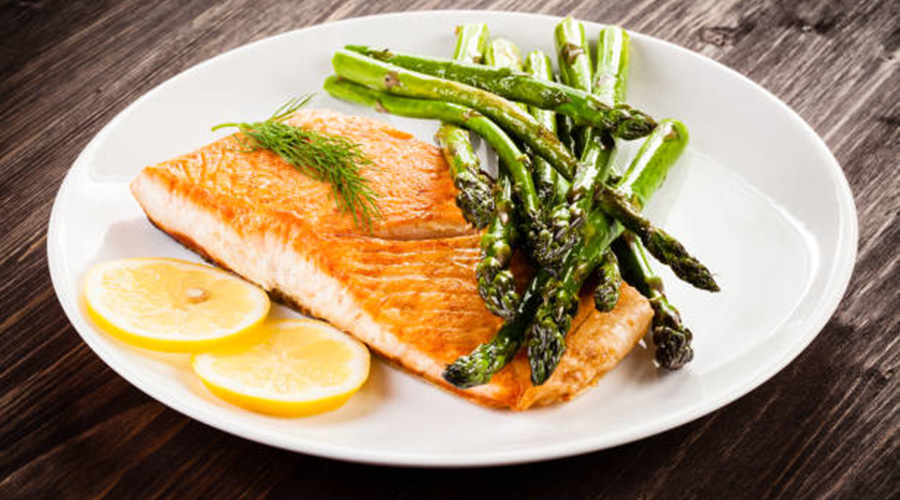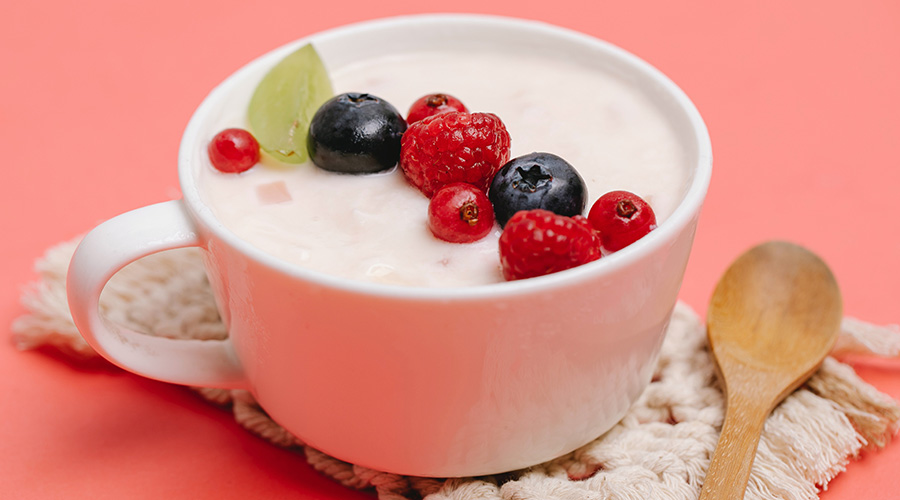· 6 min read
Heart-Healthy & Tasty Springtime Foods for Seniors
If you're a senior looking to boost your well-being through your diet, here's the list of springtime foods that you should associate into your meals.

By: Rosemarie Tamunday Casanova — RN, BSN, MHA
As we age, our bodies undergo many changes, including an increased risk of heart disease. This makes it important for seniors to take care of their hearts through a healthy diet.
the good news is that eating for a healthy heart doesn’t have to be bland or boring. With spring in full swing, there are plenty of delicious and heart-healthy foods to enjoy. From fresh berries to leafy greens, these seasonal ingredients are packed with nutrients that can help lower cholesterol, reduce inflammation, and improve overall heart health.
So if you’re a senior looking to boost your well-being through your diet, look no further than the mouth-watering options available this time of year. Whether you prefer cooking at home or dining out, there are plenty of ways to incorporate these tasty springtime foods into your meals. So let’s dive in and explore the many benefits of eating for a healthy heart this season!
Importance of a Heart-Healthy Diet for Seniors

Photo by Cottonbro Studio on Pexels
Heart disease is the leading cause of death among seniors, accounting for more than a quarter of all deaths in this age group. This makes it crucial for seniors to take steps to protect their hearts through lifestyle changes, including a healthy diet. Eating a heart-healthy diet can help lower cholesterol levels, reduce inflammation, and improve overall cardiovascular health.
It can also help seniors maintain a healthy weight, which is important for reducing the risk of heart disease and other chronic conditions.
Benefits of Incorporating Springtime Foods into a Heart-Healthy Diet

Photo by Askar Abayev on Pexels
Springtime brings a bounty of fresh fruits and vegetables that are not only delicious but also packed with nutrients that are good for the heart. For example, strawberries are high in antioxidants and vitamin C, which can help reduce inflammation and support healthy blood vessels.
Asparagus is another springtime favorite that is rich in folate, which can help lower levels of homocysteine, a compound linked to an increased risk of heart disease. Other heart-healthy springtime foods include leafy greens, salmon, and nuts.
Top Springtime Foods for a Healthy Heart
If you’re looking for inspiration for your springtime meals, here are some heart-healthy foods to consider:
Asparagus
Asparagus is a nutrient-dense vegetable that is low in calories and high in fiber. It is also rich in vitamins A, C, E, and K, as well as folate and chromium. Asparagus is also a good source of antioxidants, which can help protect the heart from damage caused by free radicals. Try roasting asparagus in the oven with a drizzle of olive oil and a sprinkle of salt and pepper for a simple and delicious side dish.
Strawberries
Strawberries are a delicious and nutritious fruit that are high in antioxidants and vitamin C. They are also a good source of fiber and potassium, which can help lower blood pressure. Strawberries are versatile and can be enjoyed in a variety of ways, from topping your morning oatmeal to adding them to a salad.
Salmon
Salmon is a rich source of omega-3 fatty acids, which can help reduce inflammation and improve heart health. It is also high in protein and low in saturated fat, making it a heart-healthy choice for seniors. Try grilling or baking salmon and serving it with a side of asparagus or roasted vegetables.
Nuts
Nuts are a great source of healthy fats, fiber, and protein. They are also rich in antioxidants and other nutrients that can help protect the heart. Walnuts, almonds, and pistachios are all good options for a heart-healthy snack.
Recipes for Heart-Healthy Springtime Meals and Snacks
Here are some delicious and heart-healthy recipes to try this spring:
Strawberry Spinach Salad

Ingredients:
- 4 cups baby spinach
- 1 cup sliced strawberries
- 1/4 cup crumbled feta cheese
- 1/4 cup chopped walnuts
- 2 tablespoons balsamic vinegar
- 1 tablespoon olive oil
- 1/2 teaspoon honey
- Salt and pepper to taste
Directions:
- In a large bowl, combine spinach, strawberries, feta cheese, and walnuts.
- In a small bowl, whisk together balsamic vinegar, olive oil, honey, salt, and pepper.
- Drizzle dressing over salad and toss to combine.
Grilled Salmon with Asparagus

Ingredients:
- 4 salmon fillets
- 1 pound asparagus
- 2 tablespoons olive oil/li>
- Salt and pepper to taste
- Lemon wedges for serving
Directions:
- Preheat grill to medium-high heat.
- Brush salmon fillets and asparagus with olive oil and season with salt and pepper.
- Grill salmon and asparagus for 10-12 minutes, or until salmon is cooked through and asparagus is tender.
- Serve with lemon wedges.
Mixed Berry Smoothie

Ingredients:
- 1 cup mixed berries (strawberries, blueberries, raspberries)
- 1/2 cup plain Greek yogurt
- 1/2 cup almond milk
- 1 tablespoon honey
- 1/2 teaspoon vanilla extract
Directions:
- Combine all ingredients in a blender and blend until smooth.
- Pour into a glass and enjoy.
Tips for Meal Planning and Grocery Shopping for a Heart-Healthy Diet
Planning and preparing heart-healthy meals can be easy with a little bit of planning and organization. Here are some tips to help you get started:
Make a grocery list before heading to the store to ensure you have all the ingredients you need for your meals. Choose lean proteins, such as chicken, fish, and beans, to reduce saturated fat intake. Incorporate plenty of fruits and vegetables into your meals for added fiber and nutrients.
Avoid processed and packaged foods, which are often high in sodium and unhealthy fats. Experiment with new recipes and cooking techniques to keep things interesting.
Lifestyle Factors that Contribute to a Healthy Heart
In addition to a healthy diet, there are other lifestyle factors that can help keep your heart healthy as you age. These include:
Regular exercise and physical activity, which can help reduce the risk of heart disease and other chronic conditions. Stress management techniques, such as deep breathing and meditation, which can help reduce stress and lower blood pressure. Getting enough sleep, which is important for overall health and well-being.
Resources for Seniors Looking to Adopt a Heart-Healthy Diet
If you’re looking to adopt a heart-healthy diet, there are many resources available to help you get started. Some options include:
Working with a nutritionist or dietitian, who can provide personalized nutrition advice and meal planning. Joining a community-based nutrition program, such as Meals on Wheels, which provides nutritious meals to seniors. Using online resources, such as the American Heart Association’s website, which offers recipes, meal plans, and nutrition information.
Benefits of Working with a Nutritionist or Dietitian
Working with a nutritionist or dietitian can be a great way to get personalized advice and support for adopting a heart-healthy diet. A nutritionist or dietitian can help you:
Identify foods that are good for the heart and incorporate them into your meals. Develop a meal plan that meets your specific nutritional needs and preferences. Provide ongoing support and accountability to help you stay on track with your goals.
Conclusion
Eating for a healthy heart doesn’t have to be a chore. With the abundance of delicious and nutritious springtime foods available, seniors can enjoy flavorful meals that are good for their hearts. By incorporating fruits and vegetables, lean proteins, and healthy fats into their diets, seniors can help reduce their risk of heart disease and other chronic conditions.
With a little bit of planning and organization, adopting a heart-healthy diet can be easy and enjoyable. So why not start today and take the first step towards better heart health?



